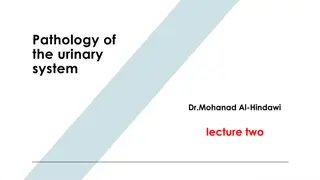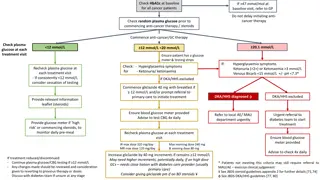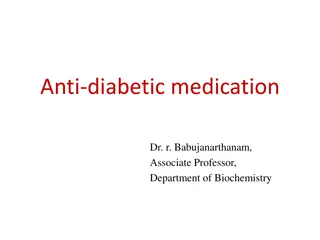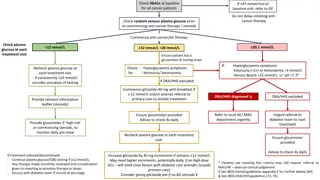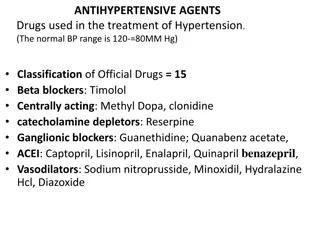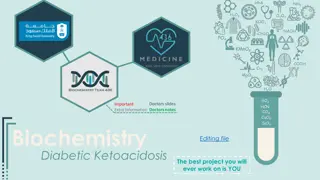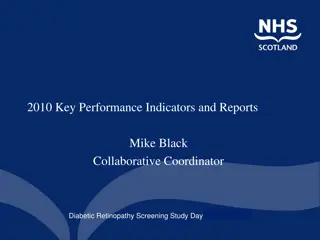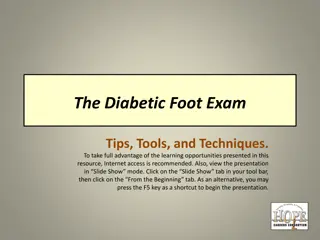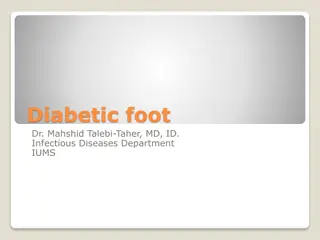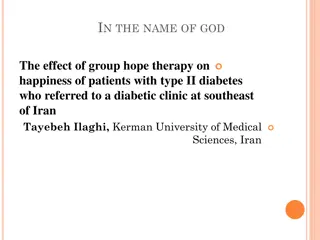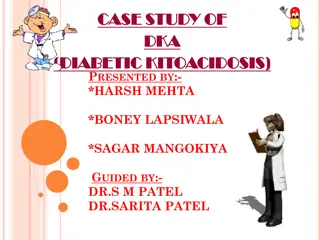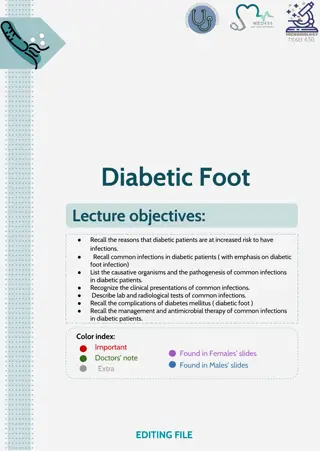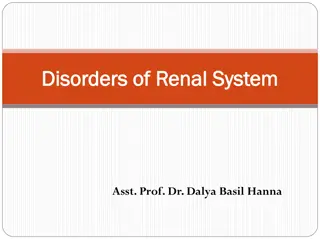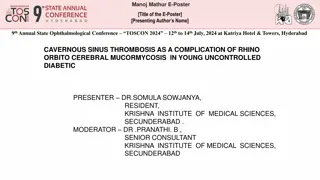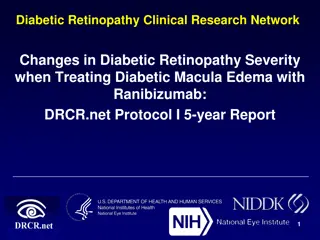Entrepreneurship Project: Development of Diabetic Canned Rasgulla Plant
Rasgulla, a popular Indian sweet, can be preserved using canning techniques for an extended shelf life. This project explores the establishment of a canned rasgulla production business, highlighting market demand, investment requirements, licensing procedures, and more. Canned rosogolla has high dem
1 views • 15 slides
Pathology of the urinary system
Focal segmental glomerulosclerosis (FSGS) is characterized by sclerosis of some glomeruli, while membranous nephropathy (MN) involves subepithelial immunoglobulin deposits. FSGS can lead to end-stage renal disease, with poor response to corticosteroid therapy. MN, on the other hand, shows diffuse ca
1 views • 20 slides
Diabetic Ketoacidosis: Understanding Metabolic Acidosis in Diabetes
Explore a case study on diabetic ketoacidosis to understand the basis of metabolic acidosis in type 1 diabetes mellitus, differentiate between type 1 and type 2 diabetes, predict blood buffer equilibrium changes, apply Winter's formula, correlate clinical data with biochemical tests, explain insulin
3 views • 34 slides
Selective Aldose Reductase Inhibitor for Diabetic Cardiomyopathy Treatment
The ARISE-HF study presents primary results on the effectiveness of a selective aldose reductase inhibitor in treating diabetic cardiomyopathy, a common complication of diabetes mellitus leading to heart failure. The study highlights the increased risk of heart failure in individuals with diabetes,
2 views • 23 slides
Dermatologic manifestations of diabetes mellitus.
The presentation slides discuss various dermatologic manifestations of diabetes mellitus, including acanthosis nigricans, diabetic dermopathy, acrochordons (skin tags), and necrobiosis lipoidica diabeticorum (NLD). Each feature description, location, mechanism, and treatment options are detailed alo
8 views • 10 slides
Case Study: Managing High HbA1c and Normal Fasting Glucose Levels
A case study discusses a 69-year-old woman with a history of stable diabetes facing elevated HbA1c levels despite normal fasting glucose. Initial investigations, including a day curve test, reveal high postprandial glucose levels. The analysis leads to identifying iron deficiency anemia, prompting f
9 views • 22 slides
Cutaneous Manifestations of Systemic Diseases: Endocrine Disorders and Diabetes Mellitus
Explore the cutaneous manifestations of systemic diseases, particularly focusing on endocrine disorders like diabetes mellitus. Learn about the dermatologic signs associated with conditions such as hypothyroidism, hyperthyroidism, Addison's disease, and Cushing syndrome. Discover specific manifestat
0 views • 88 slides
Diabetic FootCare At Home
Let us help in treating your foot problems! Avail of the new trending Diabetic FootCare at Home in Dubai that has been trending new home health service.
2 views • 5 slides
Autoimmunity Screening for Kids (ASK) Study Findings in Colorado Population
Autoimmunity Screening for Kids (ASK) conducted a study in Colorado on over 30,000 children aged 1-17, revealing a 1.0% prevalence of pre-symptomatic Type 1 Diabetes (T1D) and a 2.1% prevalence of celiac disease/autoimmunity. The screening showed a significant reduction in Diabetic Ketoacidosis (DKA
1 views • 15 slides
Guidelines for Monitoring Blood Glucose in Cancer Patients Undergoing Anti-Cancer Therapy
Guidelines recommend checking HbA1c and random plasma glucose levels at baseline for all cancer patients before initiating anti-cancer therapy. Regular monitoring of plasma glucose levels during treatment is essential, with specific actions based on glucose readings. Immediate referrals and treatmen
0 views • 4 slides
Senior Wellness Presentation: Managing Diabetes Through Exercise
Explore the benefits of exercise in managing diabetes for seniors, including tips on starting an exercise routine and preventing health issues associated with diabetes. Discover how exercise can improve insulin sensitivity and overall well-being for individuals with Type 2 Diabetes. The presentation
0 views • 14 slides
Overview of Anti-Diabetic Medication and Treatment Options
Anti-diabetic medications are used to treat diabetes by lowering glucose levels in the blood. There are various classes of drugs such as insulin, sensitizers, secretagogues, and more, each targeting different aspects of diabetes management. Type 1 diabetes requires insulin injections, while Type 2 d
0 views • 5 slides
Case Review: Diagnostic Dilemma in Urology - Management Approach for a Patient with Abdominal Pain and Fever
A 58-year-old man with a history of diabetes and hypertension presents with fever and abdominal pain, raising multiple differential diagnoses including symptomatic AAA, pyelonephritis, acute appendicitis, complicated urolithiasis, or diabetic ketoacidosis. The case explores clinical manifestations,
1 views • 35 slides
Understanding Achilles Tendinopathy: Causes, Symptoms, and Management
Achilles tendinopathy refers to pain, swelling, and physical impairment of the Achilles tendon. The causes include excessive loading, tight calf muscles, increased body weight, and biomechanical factors. Symptoms range from pain along the tendon to restricted ankle movement. Diagnosis involves a hea
0 views • 12 slides
Guidelines for Managing Hyperglycemia in Cancer Patients Receiving Anti-Cancer Therapy
Cancer patients undergoing anti-cancer therapy need vigilant monitoring for hyperglycemia. Baseline HbA1c and random plasma glucose levels must be checked before initiating therapy. Regular glucose monitoring, symptom assessment, and ketone testing are crucial throughout treatment. Prompt referrals,
0 views • 4 slides
Overview of Antihypertensive Agents and their Mechanisms of Action
Explore the classification of antihypertensive agents used in treating hypertension, including beta blockers, centrally acting agents, ganglionic blockers, ACE inhibitors, vasodilators, and more. Learn about the Renin-Angiotensin System, ACE inhibitors, and specific drugs like Captopril and Benazepr
0 views • 9 slides
Update on Diabetic Ketoacidosis (DKA) Guidelines by UHB and JBDS
There has been a recent update in the Diabetic Ketoacidosis (DKA) guidelines by UHB and JBDS. The new guidelines include reducing the insulin infusion rate to 0.05 units/kg/hr once blood glucose levels reach 14mmol/l. Additionally, alongside a 10% glucose administration of 125ml/hr is recommended to
1 views • 12 slides
Aldol Condensation Reaction for Benzalacetophenone Preparation
Aldol condensation is a key reaction for preparing benzalacetophenone, also known as chalcones. Chalcones are unsaturated aromatic ketones with various medicinal applications, showcasing activities like anti-diabetic, anti-inflammatory, and anti-bacterial effects. The reaction involves combining ben
0 views • 10 slides
Understanding Nephrotic Syndrome in Pediatric Patients
Nephrotic syndrome is a significant chronic disease in children characterized by heavy proteinuria, hypoalbuminemia, edema, and hyperlipidemia. It is primarily idiopathic, with secondary causes including SLE, sickle cell disease, and infections. The pathophysiology involves glomerular dysfunction le
0 views • 43 slides
Understanding Diabetic Emergencies: DKA, HHS, Hypoglycemia
This lecture focuses on diabetic emergencies such as Diabetic Ketoacidosis (DKA), Hyperosmolar Hyperglycemic State (HHS), and Hypoglycemia. It discusses the definitions, causes, mechanisms, manifestations, and management of these critical conditions. By the end of the session, students will have a c
0 views • 40 slides
Research Questions, Objectives, and Hypotheses in Diabetes Management
Explore the formulation of research questions, setting study objectives, and defining hypotheses in the context of diabetes mellitus management. Delve into the prevalence of diabetes in Saudi Arabia, glycemic control in diabetic patients, and addressing key research questions to reduce the impact of
0 views • 43 slides
Understanding Endocrine Emergencies and Diabetes Mellitus
The endocrine system plays a crucial role in regulating various bodily functions through hormone release. This presentation by Mrs. Bincy Cherian delves into endocrine emergencies, specifically focusing on Diabetes Mellitus. It explains the differences between Type I and Type II diabetes, their clin
3 views • 28 slides
Final 2022 Plan Certification Standards Overview
The Final 2022 Plan Certification Standards aim to enhance healthcare utilization, align consumer incentives, improve value proposition, and promote easy access to health information for enrollees. Modifications include coverage requirements for primary care, mental health visits, generic drugs, and
4 views • 9 slides
Comprehensive Overview of Diabetic Retinopathy Screening Study
This comprehensive report delves into the key performance indicators, reports, populations, dates, and screening outcomes of the Diabetic Retinopathy Screening Study conducted on November 4th, 2008. It covers aspects such as screening uptake, performance, ophthalmology care, successful and unsuccess
0 views • 11 slides
Understanding Low-Calorie, Diabetic, and Dietetic Ice Cream
Ice cream is a beloved frozen treat that can be modified to cater to various dietary needs, such as low-calorie, reduced-fat, diabetic-friendly, and dietetic options. From traditional ice cream to probiotic-enhanced variations, this article delves into product standards, fat content guidelines, arti
0 views • 14 slides
The Diabetic Foot Exam: Tips, Tools, and Techniques
Explore a comprehensive resource on conducting diabetic foot exams, including steps, sample forms, best practices, and neurological assessments. Learn about patient history, general inspection, musculoskeletal assessment, risk classification, and more. Utilize provided videos and links for a better
0 views • 23 slides
Acute Diabetic Ketoacidosis in a 19-Year-Old Male
Acute presentation of a 19-year-old man with diabetic ketoacidosis (DKA) characterized by hyperglycemia, anion-gap acidosis, and ketosis. Clinical findings include dehydration, hyponatremia, hypotension, altered consciousness, and abdominal pain. Immediate management involves ABCs, fluid resuscitati
0 views • 16 slides
Retinal Imaging Conference - Case Study of Diabetic Patient with Blurry Vision
A 52-year-old African American female with a history of diabetes and hypertension presented with occasional blurry vision in her left eye. Examination revealed retinal thickening, cystic spaces, and disruption of retinal layers. Autofluorescence imaging showed hyperautofluorescence centrally and hyp
0 views • 27 slides
Understanding the Diabetic Foot: Stages, Assessment, and Management
Explore the natural history of the diabetic foot, from initial stages to potential complications like ulcers and infections. Learn about the assessment of ulcerated feet, including identifying signs of infection and necrosis. Discover the role of radiography and microbiological control in managing d
0 views • 51 slides
Pediatric Diabetic Ketoacidosis: Diagnosis, Management, and Case Studies
Management of pediatric diabetic ketoacidosis (DKA) is crucial to prevent complications such as cerebral edema and hypoglycemia. This content covers the incidence of DKA in children, traditional aims of DKA management, guidance from BSPED, and case studies for practical application. Learn to diagnos
0 views • 38 slides
Diabetes Collaborative Project 2015-2016 Summary
In the Diabetes Collaborative Project 2015-2016, a random sample of 75 diabetic patients' records were queried monthly at each clinic site, with a total sample size of 450 patients reviewed monthly. Outreach activities were conducted based on sample data results. Metric goal variations were observed
0 views • 7 slides
Understanding Diabetic Foot Ulcers: Causes, Types, and Treatment
Diabetic foot ulcers are a common complication among diabetic patients, leading to disability and hospital admissions. The ulcers can be caused by factors like neuropathy and ischemia. Identifying the types, such as neuropathic and ischemic ulcers, helps in determining appropriate treatment, which m
0 views • 12 slides
Impact of Group Hope Therapy on Happiness in Type II Diabetic Patients: A Study in Southeast Iran
Diabetes poses significant health challenges globally, with increasing prevalence in Iran. This research investigates the effectiveness of group hope therapy in enhancing the happiness levels of patients with type II diabetes in a clinic in southeast Iran. Hope therapy, a coping strategy for incurab
0 views • 40 slides
Influence of Medicinal Plant Extracts on Lipid Peroxidation in Diabetic Rats
Traditional medicinal plant knowledge plays a crucial role in diabetes treatment. Free radicals and oxidative stress are key factors in diabetic complications. This study investigates the effects of three plant extracts on lipid peroxidation in diabetic rats, highlighting the potential benefits of n
0 views • 20 slides
Understanding Diabetes-Related Liver Diseases and Their Diagnostic Criteria
Explore the various liver diseases associated with diabetes, such as Glycogenic Hepatopathy, Diabetic Hepatosclerosis, and Hepatogenous Diabetes, along with their etiology, diagnosis, and management. Learn about rare conditions like Glycogenic Hepatopathy characterized by glycogen accumulation and h
0 views • 36 slides
Case Study of Diabetic Ketoacidosis (DKA) in a 5-Year-Old Female Patient
A case study on a 5-year-old female patient admitted with symptoms of pain in the right ear, neck, vomiting, and fever. The patient initially sought treatment for ear pain at another hospital before becoming unconscious and being brought to a civil hospital. Biochemistry results revealed abnormaliti
0 views • 39 slides
Understanding Diabetic Foot Infections and Associated Risks
Diabetic patients are prone to infections, significantly impacting morbidity and mortality rates. Increased infection risk is due to both host-related and organism-related factors. Common infections in diabetic patients include skin and soft tissue infections, diabetic foot infections, respiratory t
0 views • 14 slides
Understanding Diabetic Glomerulosclerosis in Renal Disorders
Diabetic glomerulosclerosis is a condition characterized by thickening of the glomerular basement membrane, leading to increased permeability. It belongs to diabetic nephropathy and poses a risk for pyelonephritis. The progression of this disease involves the deposition of proteins in the mesangial
0 views • 19 slides
Cavernous Sinus Thrombosis Complication in Young Diabetic - Case Study from TOSCON 2024
Cavernous sinus thrombosis is a severe complication of rhino-orbito-cerebral mucormycosis in a young uncontrolled diabetic patient presented at the 9th Annual State Ophthalmological Conference (TOSCON) 2024. The case involves a 30-year-old male with diabetes, experiencing headache, fever, and rapid
0 views • 6 slides
Long-Term Effects of Ranibizumab Treatment on Diabetic Retinopathy Severity: DRCR.net Protocol I 5-Year Report
Phase 3 trials have demonstrated favorable changes in diabetic retinopathy severity in eyes treated with ranibizumab for diabetic macular edema. This study focuses on the 5-year outcomes of ranibizumab therapy in managing diabetic retinopathy progression, especially with decreasing exposure to anti-
0 views • 24 slides

